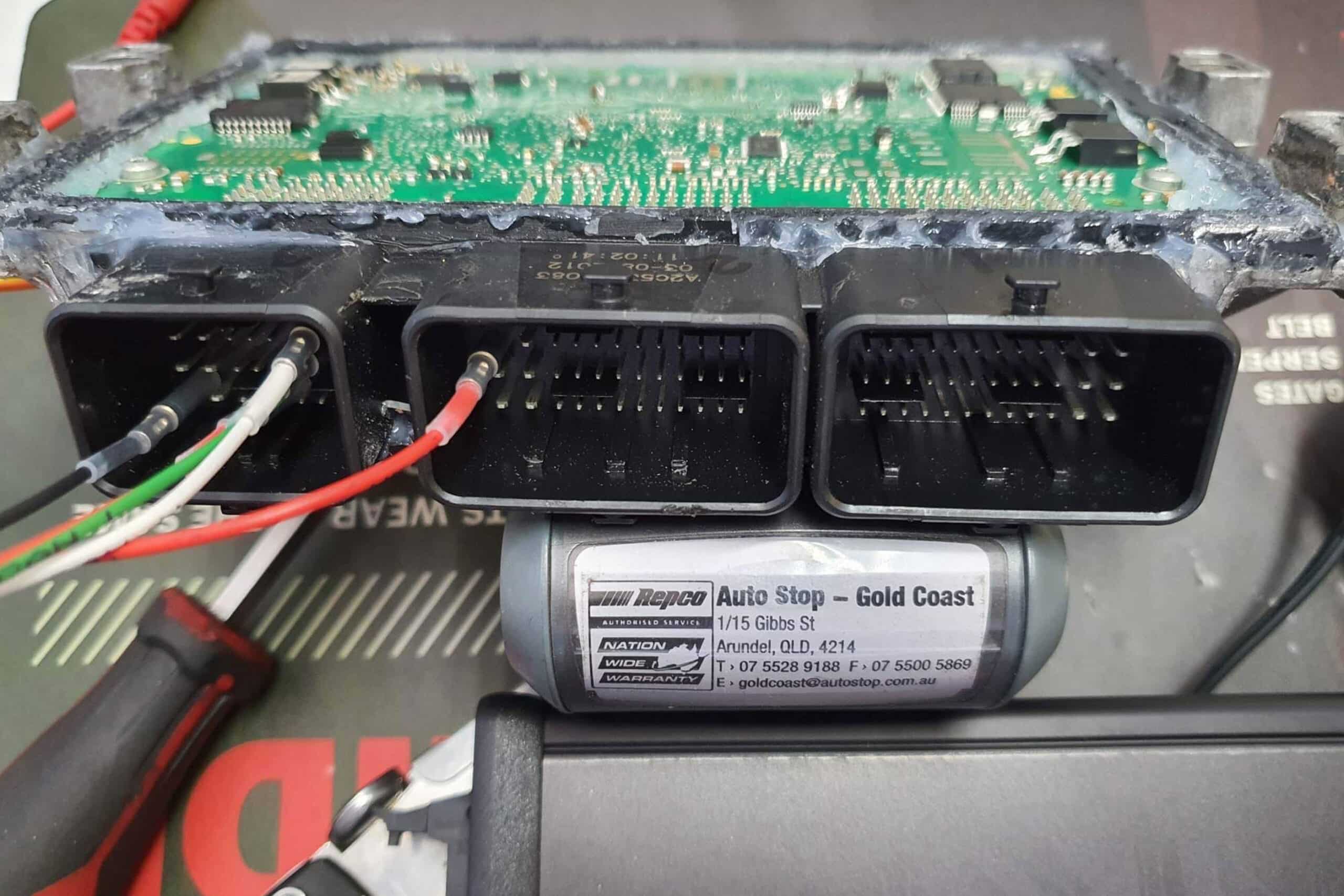
A Full Guide To ECU Cloning, The Benefits + Case Study
ECU cloning is a process that involves copying the software and data from one Engine Control Unit (ECU) to another. While it may sound like a foreign concept to some, ECU cloning can be a useful tool for vehicle owners and mechanics in certain situations. Whether it’s replacing a damaged ECU, upgrading to a newer version of the software, or customising the engine management system, there are various reasons for conducting an ECU clone. But what exactly is the process of ECU cloning and what are the benefits and challenges of doing so? In this article, we will take a deep dive into ECU cloning and even showcase a recent case study of an ECU clone for an Auto Stop customer, to give you a better understanding of this complex topic.
The ECU explained
The Engine Control Unit (ECU) is a computerised system that regulates and controls the engine’s performance and emissions in a vehicle. It receives input from various sensors throughout the vehicle, including the oxygen sensor and throttle position sensor and uses this data to adjust the engine’s functions accordingly.
In a vehicle’s engine management system, the ECU plays a crucial role in controlling the air-fuel mixture, ignition timing and other aspects of the engine’s operation. It uses data from sensors to calculate the optimal air-fuel ratio for the engine and makes adjustments to the fuel injection and ignition timing to maintain it. This helps to optimise the engine’s performance and fuel efficiency while also reducing emissions.
The ECU also monitors the engine’s performance and emissions and can make adjustments as needed to ensure that the engine is operating within safe and emissions-compliant limits. For example, if the oxygen sensor detects that the engine is running too lean (too much air and not enough fuel), the ECU will increase the fuel injection to bring the air-fuel ratio back into balance.
In terms of engine performance, the ECU also has the capability to optimise engine performance by adjusting torque, horsepower and other parameters, resulting in an enhanced driving experience. For example, it can adjust the engine timing, the valve timing and the fuel injection to provide more power when the driver demands it.
The ECU is vital to playing a crucial role in regulating and controlling the engine’s performance and emissions in a vehicle. It is responsible for gathering data from various sensors throughout the vehicle, analysing that data to control the engine’s operation and monitoring the engine’s performance and emissions levels. Based on this analysis, the ECU makes necessary adjustments to ensure the engine is running within safe parameters and meets strict emissions standards.
What is ECU Cloning?
ECU (Engine Control Unit) cloning is the practice of duplicating the software from one ECU and installing it on another, so that the new ECU operates similarly to the original one.

New ECU (left) and Old ECU (right) before going through the ECU cloning process
The Reasons for cloning an ECU
Your ECU may be damaged and needs replacement:
In the event that the original ECU becomes damaged, such as from a collision or water damage, it may be necessary to replace it with a cloned ECU. This allows the vehicle to continue running without the need for costly repairs to the original ECU.
Upgrading to a newer version of the ECU software:
If a newer version of the ECU software becomes available that offers improved performance or emissions control, the original ECU can be cloned onto a replacement unit with the updated software.
Customizing the engine management system:
Some vehicle owners may want to modify their engine management system to suit their specific needs, such as increasing horsepower or torque. Cloning the original ECU onto a replacement unit allows for these types of modifications to be made.
Cost savings:
Cloning an ECU can be a cost-effective solution when compared to purchasing a brand new ECU or having the original ECU repaired.
Using a preferred brand of ECU:
If the original ECU is suspected of malfunctioning or causing problems with the engine, it may be useful to clone the original ECU onto a replacement unit that is known to be in good working condition. This can help to eliminate any issues caused by the original ECU and ensure that the engine is running properly.
The ECU Cloning Process Explained
The process of ECU cloning involves copying the software and data from one Engine Control Unit (ECU) to another. The process typically includes the following steps:
Reading the original ECU:
The original ECU is connected to a specialized tool, such as a diagnostic scanner, that is capable of reading the software and data stored on the ECU. This process is known as “reading” the ECU.
Saving the original ECU’s data:
The software and data read from the original ECU is then saved to a computer or other storage device. This is known as “dumping” the original ECU.
Preparing the replacement ECU:
The replacement ECU, which will receive the software and data from the original ECU, is then prepared for the cloning process. This may involve wiping any existing software and data from the replacement ECU or making any necessary hardware modifications.
Writing the original ECU’s data to the replacement ECU:
The software and data from the original ECU is then written to the replacement ECU. This process is known as “flashing” the replacement ECU.
Verifying the replacement ECU:
The replacement ECU is then connected to a diagnostic scanner and the software and data on the replacement ECU is verified to ensure that it matches that of the original ECU.
Installing the replacement ECU:
The replacement ECU is then installed in the vehicle and connected to the engine management system. It is thoroughly checked to ensure that everything is working correctly and is optimised to the vehicle’s requirements.

Old ECU being cloned before transferring data to new ECU
It’s important to note that ECU cloning has strict regulations in many countries including the United States, Canada and the European Union. In Australia ECU cloning is permitted however for some vehicle manufactures it can void the vehicle’s warranty. Also, if not done correctly, it can cause serious issues with the engine performance, emissions and safety. It’s recommended to avoid trying to clone an ECU by yourself without the access to the right tools, equipment and professional help of an ECU cloning expert.
The Benefits of cloning an ECU
While you may be cloning an ECU simply because it needs an upgrade, or it’s damaged, there are some benefits from cloning the ECU. These include:
- Improved engine performance: Cloning an ECU can fine-tune the engine’s settings, allowing for better performance and increased power.
- Increased fuel efficiency: By optimizing the engine’s settings, an ECU clone can help reduce fuel consumption and increase kilometres per litre.
- Reduced emissions: By fine-tuning the engine settings, an ECU clone can help reduce emissions, making the vehicle more environmentally friendly.
- Better drivability: Cloning an ECU can result in smoother and more responsive acceleration, making the vehicle more enjoyable to drive.
- Increased vehicle value: A cloned ECU can improve the overall performance of the vehicle, making it more desirable and increasing its resale value.
ECU Clone Case Study At Auto Stop Brisbane & Gold Coast

Old ECU (right) opened up before it gets cloned, updated and put onto the new ECU (left)
Auto Stop recently performed a successful ECU clone on a Renault Meagne Rs250. The old ECU in this vehicle had a previous repair that was not performing correctly so the vehicle had issues. Fortunately for the owner of this vehicle that after the ECU clone, the vehicle stopped experiencing the problems it previously had.
In saying that, one of the challenges of the ECU clone for this vehicle was the ECU had a range of locks to the data as well as the clone was affected due to the vehicle’s engine immobiliser and alarm system. It required a lot of testing and professional knowledge to ensure the clone was done correctly.
When conducting an ECU clone you can run into several challenges, this is typical of many vehicles and these challenges can include:
Challenges with ECU cloning:
Difficulty in obtaining the original ECU: In some cases, the original ECU may be difficult to obtain, particularly for older or rare vehicles.
Varying software versions: Different vehicles may have different software versions for their ECUs, making it difficult to find an exact match for the replacement unit.
Security measures: Modern ECUs often have built-in security measures, such as encryption and code signing, that make it difficult to clone the unit without specialized equipment and expertise.
Difficulty in programming: Programming an ECU can be a complex process that requires specialised tools and expertise.
Manufacturer issues: Some manufacturers will void the vehicles warranty if you modify or adjust the vehicle’s original ECU.
Verification of proper function: ECU cloning may not always guarantee that the replacement unit will function correctly or properly communicate with other control units in the vehicle.
The good news is that when you use a trusted ECU specialist (like Auto Stop) then you have peace of mind knowing that your vehicle is in great hands. It’s important to ensure that you use a specialist in ECU who understands your vehicle and the challenges it may present while undergoing an ECU clone.
Auto Stop are professionals in ECU cloning and we have a comprehensive service for ECU cloning in both Brisbane and Gold Coast. Contact us for any ECU cloning questions you may have, we’re here to help.


